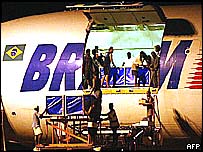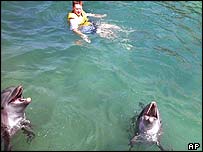|
Police blocked the airport with a huge security cordon, and ordered journalists not to take photographs as a Brasil Air DC-10 cargo jet arrived to take the bottlenose dolphins to the tourist resort of Cancun on Mexico's Yucatan Peninsula.
Villagers in the near-bankrupt Pacific state are reported to have sold them to an international syndicate for about $400 (US$265) each.
Britain's envoy to the island nation, Brian Baldwin, says the huge profit margin means high-ranking Solomons officials are likely to be involved.
"That sort of money would have inevitably attracted some big players here," he told The Associated Press news agency.
Appeals ignored
Animal rights activists tried to block the export of the dolphins, which are thought to be destined for a life as performing animals in Mexican aquatic parks.
Australia's Environment Minister David Kemp last week called on Mexico to honour a treaty it had signed on International Trade in Endangered Species of Wild Fauna and Flora, which states the importation of the mammals is illegal.
But the call was rejected by the Mexican Government, which said Parque Nizuc - the marine park running the operation - had the correct documentation.
Campaigners say captured dolphins suffer stress and refuse to eat
Nicola Beynon, a Humane Society International campaigner, said the chances of all the animals surviving the mammoth journey were slim.
"Such a massive capture of dolphins is unprecedented
and will inevitably lead to debilitated and dying animals,"
she said.
The businessmen arranging the dolphin shipment could
not have picked a more high-profile moment.
|

